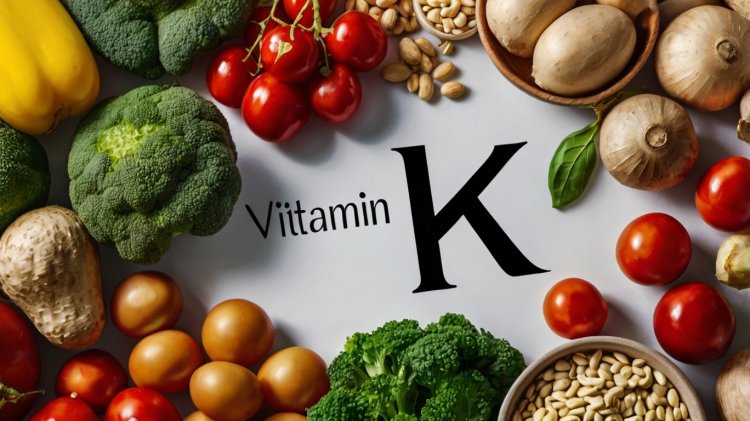Vitamin K: Everything You Need to Know
Explore the vital role of Vitamin K in blood clotting, bone health, and heart support. Learn about its benefits, deficiency symptoms, top food sources, and supplementation tips.

Vitamin K: Everything You Need to Know
Vitamin K is an essential nutrient crucial for blood clotting, bone health, and overall wellness. Found in leafy greens, vegetable oils, and fermented foods, vitamin K ensures your body functions efficiently, especially in wound healing and maintaining strong bones.
This guide explores the benefits of vitamin K, signs of deficiency, dietary sources, supplements, and those who may need to limit their intake.
What Is Vitamin K?
Vitamin K refers to a group of fat-soluble vitamins that play a vital role in blood clotting and calcium regulation. The two primary forms of vitamin K are:
-
Vitamin K1 (Phylloquinone): Found in plant-based foods like leafy greens.
-
Vitamin K2 (Menaquinone): Found in animal products and fermented foods. It’s also produced by gut bacteria.
How Vitamin K Works
-
Blood Clotting: Activates proteins that help clot blood and prevent excessive bleeding.
-
Bone Health: Facilitates calcium binding to bones, supporting density and strength.
Is Vitamin K the Same as Potassium?
No, vitamin K and potassium are distinct nutrients:
-
Vitamin K: A fat-soluble vitamin crucial for blood and bone health.
-
Potassium: A mineral and electrolyte that regulates fluid balance and nerve function.
Both are vital for health but serve different roles in the body.
Benefits of Vitamin K
1. Supports Blood Clotting
Vitamin K activates clotting factors in the blood, ensuring efficient wound healing and preventing excessive bleeding.
2. Promotes Bone Health
Vitamin K works with calcium to strengthen bones and reduce the risk of fractures and osteoporosis.
3. Boosts Heart Health
By preventing calcium deposits in arteries, vitamin K helps reduce the risk of heart disease and supports vascular health.
Summary
Vitamin K is indispensable for blood clotting, bone strength, and cardiovascular health.
Symptoms of Vitamin K Deficiency
While rare, vitamin K deficiency can lead to:
-
Uncontrolled bleeding (hemorrhaging).
-
Easy bruising.
-
Frequent nosebleeds.
-
Blood in stools.
At-Risk Groups
-
Newborns: Without vitamin K injections, they are at risk of bleeding disorders.
-
People with Malabsorption Conditions: Includes celiac disease, Crohn’s disease, and ulcerative colitis.
-
Post-Weight Loss Surgery Patients: Reduced nutrient absorption increases deficiency risk.
Foods Rich in Vitamin K
Incorporate these foods into your diet to boost vitamin K intake:
| Food | Vitamin K Content (per serving) |
|---|---|
| Kale (1 cup, raw) | 684% of the Daily Value (DV) |
| Spinach (1 cup, raw) | 181% of the DV |
| Broccoli (1/2 cup, cooked) | 92% of the DV |
| Brussel sprouts (1/2 cup, cooked) | 91% of the DV |
| Vegetable oils (1 tbsp) | Varies |
| Blueberries (1/2 cup) | 14% of the DV |
| Eggs (1 large) | 10% of the DV |
Tip
Combine vitamin K-rich foods with healthy fats like olive oil for better absorption.
Vitamin K Supplements: Do You Need Them?
For most people, a balanced diet provides adequate vitamin K. However, supplements may benefit:
-
People with absorption disorders.
-
Those recovering from surgery.
-
Individuals on specific medications that hinder vitamin K absorption.
Risks of Supplements
High doses of vitamin K supplements can interfere with medications like blood thinners and certain cholesterol-lowering drugs.
Who Should Limit Vitamin K?
While vitamin K is generally safe, some individuals may need to monitor intake:
-
People on Blood Thinners (e.g., Warfarin): High vitamin K intake can reduce medication effectiveness.
-
Those Taking Cholestyramine or Colestipol: These drugs can interfere with vitamin K absorption.
-
Patients Using Weight Loss Drugs: Such as Orlistat, which can reduce fat-soluble vitamin levels.
Always consult your healthcare provider for personalized










